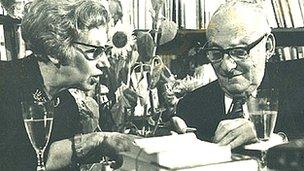Swiss bank to lift lid on hidden Kafka works
- Published

Max Brod left the papers to his secretary, Esther Hoffe
Safe deposit boxes believed to contain manuscripts and drawings by the late author Franz Kafka are due to be opened at a bank in Zurich.
The move is the latest twist in a long legal battle over who owns the papers.
Two Israeli sisters say they inherited the documents from their mother, but the Israeli state claims them as part of the country's cultural heritage.
The contents will be examined by an expert who will report to the judge handling the case.
Literary archives around the world say the manuscripts, hidden for decades, must at least be made public.
Franz Kafka was one of the most enigmatic authors of the 20th Century.
He died of tuberculosis in 1924 aged only 40 and, if his own last wishes had been followed, novels such as The Trial and The Castle would never have seen the light of day.
Kafka asked his friend and fellow writer, Max Brod, to burn his manuscripts after his death. Brod refused, publishing the novels and taking letters and other writings to Israel where he left them to his secretary Esther Hoffe - who then bequeathed them to her two daughters.
At some point during the past 50 years, the documents were stored in bank vaults in Tel Aviv and Zurich.
'Rightful inheritance'
But when the two daughters - now both in their 70s - tried to sell some of the manuscripts, the legal battle began.
Israel is claiming the documents as part of its cultural heritage arguing that because Kafka was Jewish, his works belong there.
The sisters say the works are their rightful inheritance to dispose of as they wish. Meanwhile, Germany's literary archive has offered to buy the manuscripts.
Today, on the orders of a Tel Aviv judge, the four vaults in Zurich will be opened but only for the eyes of one Kafka specialist who will itemise the contents and report back to the judge.
For the general public, the mystery of Kafka's remaining works will continue.